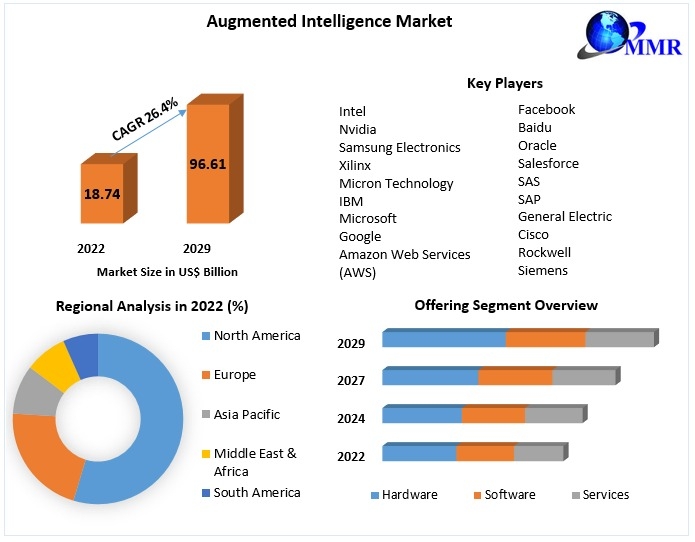Augmented Intelligence Market 2030 Strengthened by Increasing Digital Transformation

Comprehensive Analysis Highlights Market Definition, Growth Drivers, Segmentation, Country-Level Insights, Competitive Landscape, and Future Outlook
The global Augmented Intelligence Market Share is on a remarkable growth trajectory, with projections indicating a surge from its current valuation to approximately $96.61 billion by the end of 2029. This anticipated growth corresponds to a robust Compound Annual Growth Rate (CAGR) of 26.4% over the forecast period (2023-2029).
Market Definition and Estimation
Augmented intelligence, often referred to as intelligence amplification or cognitive augmentation, represents the synergistic integration of artificial intelligence (AI) technologies with human intelligence. Unlike traditional AI systems that aim to replicate human cognition, augmented intelligence focuses on enhancing human decision-making capabilities by leveraging advanced data analytics, machine learning, and natural language processing. This collaborative approach enables organizations to boost productivity, improve operational efficiency, and facilitate more informed decision-making processes
To dive into the specifics, click the below link:https://www.maximizemarketresearch.com/request-sample/65777/
Several key factors are propelling the expansion of the augmented intelligence market:
-
Adoption Across Diverse Industries: Organizations across various sectors are increasingly implementing augmented intelligence tools to enhance efficiency, reduce operational costs, and optimize workforce productivity. By integrating AI capabilities, businesses can streamline processes, automate routine tasks, and focus on strategic initiatives.
Advancements in Machine Learning Technologies: Continuous developments in machine learning and AI technologies have significantly bolstered the capabilities of augmented intelligence systems. These advancements facilitate more accurate data analysis, predictive modeling, and real-time decision support, thereby enhancing the overall value proposition for end-users. -
Demand for Enhanced Decision-Making: In an increasingly data-driven world, the ability to make swift and informed decisions is paramount. Augmented intelligence provides organizations with deeper insights and analytics, enabling better decision-making processes and fostering a competitive edge in the marketplace.
-
Integration with Existing Workflows: The compatibility of augmented intelligence solutions with existing business processes and systems allows for seamless integration, minimizing disruptions and maximizing return on investment. This adaptability encourages wider adoption across various organizational functions.
-
Emerging Opportunities in Developing Economies: As developing countries continue to invest in digital transformation initiatives, there is a growing opportunity for augmented intelligence solutions to penetrate these markets. The increasing availability of data and improving technological infrastructure in these regions present fertile ground for market expansion.
-
Segmentation Analysis
The augmented intelligence market is categorized based on industry verticals, each demonstrating unique adoption patterns and growth prospects:
-
Healthcare: This sector has emerged as a dominant adopter of augmented intelligence technologies. Healthcare organizations are leveraging these tools to enhance clinical decision-making, improve patient outcomes, and optimize operational efficiencies. Notably, initiatives such as the American Medical Association's policy on Augmented Intelligence in Healthcare underscore the sector's commitment to integrating these advanced technologies.
Banking, Financial Services, and Insurance (BFSI): The BFSI sector is experiencing rapid adoption of augmented intelligence to bolster decision-making processes, enhance customer experiences, and strengthen security measures. Financial institutions are utilizing AI-driven analytics to assess credit risks, detect fraudulent activities, and personalize customer services. -
Retail: Retailers are integrating augmented intelligence to analyze consumer behavior, optimize inventory management, and enhance personalized marketing strategies. By leveraging AI insights, retailers can tailor their offerings to meet evolving customer preferences and improve sales performance.
-
Manufacturing: In the manufacturing sector, augmented intelligence is employed to monitor equipment performance, predict maintenance needs, and enhance supply chain management. These applications contribute to reduced downtime, improved product quality, and cost savings.
-
Others: Additional sectors, including education, logistics, and telecommunications, are progressively adopting augmented intelligence solutions to address industry-specific challenges and capitalize on AI-driven opportunities.
-
Country-Level Analysis
The adoption and growth of augmented intelligence technologies vary across different countries, influenced by factors such as technological infrastructure, regulatory environments, and industry readiness.
-
United States: The U.S. stands at the forefront of augmented intelligence adoption, driven by a robust technology ecosystem and significant investments in AI research and development. The country's advanced healthcare system, financial institutions, and retail giants are actively integrating augmented intelligence solutions to enhance operations and customer engagement. Supportive government policies and a culture of innovation further accelerate market growth in the region.
Germany: Germany exhibits strong potential for augmented intelligence adoption, particularly in its manufacturing and automotive sectors. The country's emphasis on Industry 4.0 initiatives aligns with the capabilities of augmented intelligence to optimize production processes, ensure quality control, and drive innovation. Additionally, Germany's commitment to data privacy and security influences the implementation strategies of AI technologies within its industries. -
Competitive Analysis
The augmented intelligence market is characterized by the presence of several key players striving to innovate and capture market share. Notable companies include:
- IBM Corporation: IBM offers a suite of augmented intelligence solutions, leveraging its Watson platform to provide AI-driven insights across various industries, including healthcare and finance. The company's focus on research and development positions it as a leader in the market.
- Augmented_Intelligence_Market
- Augmented_Intelligence_Industry
- Augmented_Intelligence_Market_Size
- Augmented_Intelligence_Market_Analysis
- Augmented_Intelligence_Market_Share
- Augmented_Intelligence_Market_Growth
- Augmented_Intelligence_Market_Demand
- Augmented_Intelligence_Market_Trends
- Augmented_Intelligence_Market_Forecast
- Questions and Answers
- Opinion
- Motivational and Inspiring Story
- Technology
- True & Inspiring Quotes
- Live and Let live
- Focus
- Geopolitics
- Military-Arms/Equipment
- Art
- Causes
- Crafts
- Dance
- Drinks
- Film/Movie
- Fitness
- Food
- Παιχνίδια
- Gardening
- Health
- Κεντρική Σελίδα
- Literature
- Music
- Networking
- άλλο
- Party
- Religion
- Shopping
- Sports
- Theater
- Wellness
- News
- Culture

